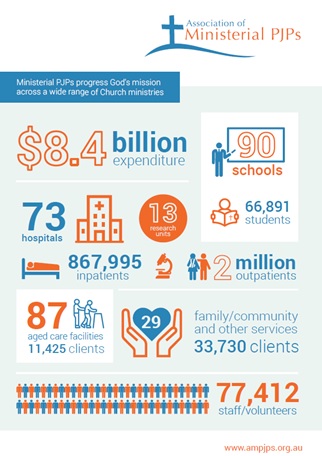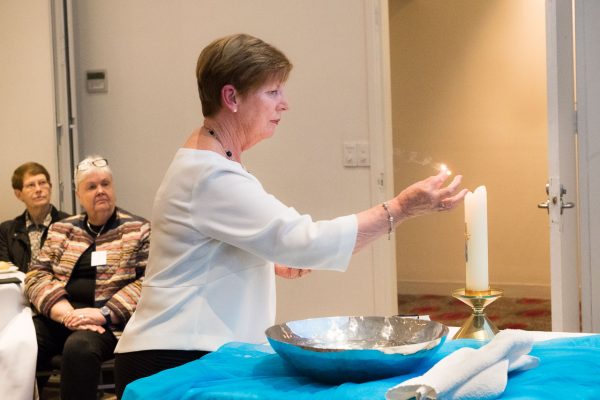AMPJP submission to Plenary Council 2020
Click here for a PDF copy of the AMPJP Submission to the Plenary Council 2020
The Holy Spirit has moved more than 222,000 people to share their hopes and concerns with the Australian Church’s Plenary Council 2020. The Association of Ministerial Public Juridic Persons (AMPJP) and its members have enthusiastically added their voices from four discernment sessions (Perth, Melbourne, Sydney and Brisbane). Held between December 2018 and February 2019, these sessions had participation from 29 trustees from across all AMPJP members.
The responses from the AMPJP’s regional meetings were synthesised and used to answer the Plenary Council’s three questions:
- What questions do you have about the future of the Church in Australia that you would like the Plenary Council to consider?
- What do you think God is asking of us in Australia at this time?
- Would you like to share a story about your experience of faith or of the Church in Australia that has shaped you?
The responses provided here reflect the range of views that were expressed by those at the AMPJP’s regional sessions.
They are not unanimously held by all Trustees or by all AMPJP member organisations.
What questions do you have about the future of the Church in Australia that you would like the Plenary Council to consider?
- How can we better be people of the Gospels – disciples living with and learning from Jesus?
- How can we more joyfully demonstrate that our God is full of tenderness, mercy and compassion?

- How can we better repent, recognise our sinfulness and have a conversion of our hearts?
- How can we be more humble and be people of the earth (ordinary and broken)?
- What structures and processes will better enable genuine and authentic listening, right relationships and respect within the Church?
- How can we better see each other as sources of hope?
- How can the Church better affirm the image of God in, and include: lay people, women, people with disabilities, Aboriginal and Torres Strait Islanders, asylum seekers/refugees, migrants, and lesbian, gay, bisexual, transgender, intersex people?
- Does the Church want to encompass all the theological/spiritual perspectives of her members and move beyond polarisation? Alternatively does the Church want to have a dominant faction that crushes other perspectives?
- How can the Church better encompass all the theological/spiritual perspectives of her members? (if that is what we decide to do)
- How do we better support the Bishops to enable changes which are necessary?
- Do we want to replace clericalism with more equitable status and more accountable authority within the Church?
- How do we replace clericalism with more equitable status and more accountable authority within the Church? (if that is what we decide to do)
- Are the Bishops committed to Church structures/processes that are collaborative and engaging?
- How do we establish governance in all areas of the Church that is open, transparent and accountable?
- How do we ensure that lay women have ministry and governance opportunities in the Church?
- How do we better empower lay people to take a greater role and be more confident in the Church?
- How can the Church grow in appreciation for the place and role of Ministerial PJPs?
- How do we both address the Church’s internal issues while also assisting individuals/groups in need and addressing national issues (e.g., environment, Indigenous, diversity, refugees)?
- Do Church ministries want to resist the temptation to just cater to the wealthy and/or create secular places of status and success for the middle class?
- How do all within the Church inspire, encourage and support our ministries to ensure they include the poor and marginalised?
- Can Church leaders take a stronger pastoral focus – emphasising the positive and life-affirming?
- How can all parts of the Catholic Church affirm and collaborate with other Christian churches and other faiths?
- How can we make our liturgy more life-giving?
- How can we have a healthy response to child sexual abuse within the Church?
- How can we better reclaim and enact the Second Vatican Council’s teachings – especially on the nature of the Church and on the nature of the world?
- How do we promote the leadership of lay ecclesial leaders who can and will speak on behalf of the Church on matters of faith and public importance?
 What do you think God is asking of us in Australia at this time?
What do you think God is asking of us in Australia at this time?
God’s vision is for an Australia where: all life is cherished and protected with equitable access to health care, education and assistance by all, here and overseas[i]. Priority issues for Australian society are: recognising and respecting Aboriginal and Torres Strait Islanders, valuing diversity, humanely fulfilling our obligations to asylum seekers/refugees, and healing the environment.
As Christians in Australia, we are invited to have a close relationship with Jesus[ii] that leads our words and actions to bring Christ to others. Our union with Christ calls us to joyfully share our experience of God with those in our lives[iii].
Our trust in the Lord can give us certain hope that God’s unfolding reign is bold and inspiring[iv]. We are especially drawn to be with Jesus at the margins – with the poor and vulnerable, including the earth[v]. When we encounter our sisters and brothers in need, we seek to work with them for their liberation from structural factors that cause and perpetuate their suffering and disadvantage[vi].
As a Church we are blessed with many hospitals, schools, community services and other ministries whose staff have a passion to prioritise assistance to the poor, vulnerable and marginalised. These Church ministries are called to be authentically Catholic with their organisational values lived by all staff and Board members. Many providing and receiving care within these ministries profess non-Christian faiths or no faith. The ministries are called to welcome all people and engage with them to find common ground[vii]. This dialogue could mature the faith perspective and experience of all[viii].
The Church is called to recognise that for many people these ministries (especially schools) are their primary experience of Church.
Ministries need to focus outwards and collaborate with others: inside and outside the Church.
Many of these ministries are under the canonical stewardship of Ministerial PJPs governed by, the predominantly lay, ecclesial leaders. Bishops/local Church and all within these ministries are called to see both the Ministerial PJP and its ministries as an integral part of the Catholic Church.
Canonical Stewards (Bishops, Religious and lay Trustees) need to trust the Boards and Executive of all Church ministries and provide them with support and influence without being overly controlling[ix]. Canonical Stewards are called to model good governance behaviour that is obviously animated by Christ[x].
The Church needs to constantly be identifying and forming people for governance roles who understand and are committed to Christ’s mission and Church[xi]. The Church is called to promote and expand lay leadership especially by women[xii].
All within the Church are called to be more active contributors to the reform/rebirth of the Church[xiii].

Would you like to share a story about your experience of faith or of the Church in Australia that has shaped you?
The first Australian Ministerial PJP was established in 1994. The median age of Australia’s eleven Ministerial PJPs is twelve years. For the most part, Ministerial PJPs are no longer experimental or in an establishment phase.
Trustees/Canonical Stewards of Ministerial PJPs are predominantly lay people – of approximately even numbers of women and men. These Trustees are responsible for staff and ministries in much the same way as a Superior is for her/his Religious Institute/Order. Trustees take seriously their role of stewardship to protect and develop the Church’s mission and resources for the duration of their term[xiv]. Applying their expertise to the role of governance is their highest priority[xv].
The lay people who are appointed as Trustees see themselves as having answered God’s call. While the role of Trustee is for a limited term, it is part of the lay person’s lifelong vocation as a disciple of Christ. Trustees try to be authentic to their life experience and constantly critique the extent to which they are responding to the Holy Spirit[xvi] and being counter-cultural. The role of Trustee is one that enthuses Trustees. They aim to be joyful – animating others and showing/passing on a vibrant faith.
Trustees say that they gain mutual support from the Association of Ministerial PJPs. Trustees are also grateful for the continuing encouragement from Bishops and Religious Institutes. They acknowledge that Religious Institutes are good role models of how to exercise authority in collegial, collaborative and empowering ways. Trustees also see their position as having some significant differences. This gives Trustees a sense of freedom that they don’t need to just imitate other Church bodies and that they can develop inclusive and collaborative structures and processes suited to their context. They trust that the Holy Spirit will help them to find new ways to continually re-found in Christ the Catholic charism of the ministries in their care.
While maintaining the Catholic nature of their ministries, Trustees also seek to give space and dignity to non-Catholics. The Trustees say that they experience God in their co-workers – both in those who do and in those who do not profess faith[xvii].
Trustees see the ministries in their care as prophetic and capable of giving hope to the Church e.g., promoting the concept that God’s mission has a Church rather than the Church has a mission.
Trustees are aware that they need to courageously take up their leadership role and be a strong voice for the ministries in their care.
Trustees see through the current strife to the important and positive aspects of the Church. Trustees see as essential that they be present, active and nurturing in the Church. This means that Trustees stand with, and support, our Bishops and other Church leaders. The AMPJP, as the collegial body of Ministerial PJPs, places importance on dialogue and on having proper relationships of partnership with ACBC and CRA.
Trustees hope that, as a new part of the Church which stands with the poor and vulnerable, they will contribute to a new credibility for the Church.
[i] Evangelii Guadium #218
[ii] Deus Caritas Est #1 and Gaudete et Exsultate #20
[iii] Evangelii Guadium #1
[iv] Zeph 3:14-20; Mk 4:30-32; Mt 11:4-5
[v] Gaudete et Exsultate #135 and Laudato si’ # 217
[vi] Evangelii Guadium #202
[vii] Lumen Gentium #8 and Gaudium et spes #44
[viii] Benedict XVI: On the occasion of Christmas Greetings to the Roman Curia 2012 and Redemptoris Missio #17
[ix] Quadragesimo Anno #79 and Caritas in Veritate # 57
[x] Mt 20:25-28 and Jn 13:13-15
[xi] Christifideles Laici #63 and Evangelli Gaudium #160
[xii] Evangelii Gaudium #103
[xiii] Catechism of the Catholic Church # 1267-70
[xiv] Mt 25:14-30
[xv] AMPJP (2018) Draft Governance Principles, Foundations and Applications
[xvi] Gaudete et Exsultate #23 and 133
[xvii] Gaudete et Exsultate #9 and Gaudium et spes #28